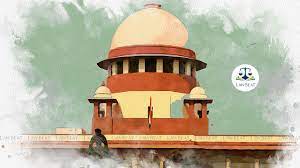'Mere Suspicion Not Enough To Frame Charge': SC Rejects CBI's plea Against Discharge of Public Bank CMD in Loan Case

Court opined that taking the material in the charge sheet as it was, the complicity of the respondent was not made out
The Supreme Court recently rejected CBI's plea challenging the discharge of Srinivas D. Sridhar, the Chairman and Managing Director of Central Bank of India, in a case involving allegations of cheating, forgery, and violations under the IPC and the Prevention of Corruption Act.
The charges pertained to the sanctioning of a substantial loan in 2010-11 for the establishment of a steel plant in Tanzania.
A bench comprising Justices Abhay S. Oka and Ujjal Bhuyan observed that mere suspicion against Sridhar was insufficient to warrant the framing of charges.
"Only because the entire proposal was processed and cleared within a short span of time, no offence is made out against the respondent. Taking the material in the charge sheet as it is, complicity of the respondent is not made out," the bench said.
Sridhar, along with several others, faced charges related to the approval of a substantial financial package, which included a Rs 50 crore short-term loan, a Rs 100 crore letter of credit, and export packing credit (EPC) facilities worth Rs 330 crore. These funds were sanctioned for the execution and establishment of a steel plant in Tanzania on a turnkey basis.
A chargesheet was filed on August 8, 2014, naming a total of seven accused, with Sridhar listed as accused number seven. At the time, he held the position of Chairman and Managing Director of the Central Bank of India.
Accused no 1 was M/s Electrotherm (India) Limited and accused No 2-Mukesh Bhanwarlal Bhandari was the Chairman of the Company. Accused no 3-Shailesh Bhanwarlal Bhandari was the Managing Director of the Company. Accused no 4-Avinash Prakashchandra Bhandari was the Joint Managing Director of the Company. Accused no 5 was one Hector Keki Vesuna, who was, at the relevant time, the Chief General Manager (Credit) of the Bank. Accused no 6 was Ramnath Pradeep, who was an Executive Director of the Bank at the relevant time.
The allegation was that the Bank was put to an undue loss of Rs 436.74 crores, and there was a corresponding gain to the Company.
An application for discharge made by Sridhar was rejected by the Special Judge of CBI Court. In a revision application, the High Court discharged him.
The CBI contended that though there may not be any allegation of receipt of pecuniary benefits against Sridhar, he abused his official position as a public servant and indulged himself in mischief or criminal misconduct, as provided in Section 13(1)(d) of the PC Act.
It further said at the stage of framing of the charge, the High Court could not have gone into the veracity of the allegations made by the prosecuting agency in the charge sheet, and this was a case where trial ought to proceed against Sridhar.
Sridhar's counsel submitted that taking the material in the charge sheets as it was, no case was made out to proceed against him, and therefore, no interference was called for.
After perusing the entire material and taking it as correct, the bench noted perhaps the only material that created suspicion was the speed with which the proposal of the Company was sanctioned.
As far as Sridhar was concerned, the court said that considering his position and the role ascribed to him in the grant of sanction to the loan proposal of the Company, mere suspicion against him was not enough to frame a charge against him.
"The proposal had passed through the Loan Advisory Committee which recommended the same. The proposal was placed before the respondent on 10th August 2010. As the credit proposal was beyond the sanctioning authority of the respondent, it was directed to be placed before the Management Committee. Apart from the Loan Clearance Committee, the proposal was approved by the Bank's Chief General Manager (Credit)," it said.
The court also noted the respondent's role started with signing the Memorandum after it was approved by the Chief General Manager (Credit) and the Executive Director.
"A perusal of the Memorandum placed before the respondent for sanction showed that as many as 14 Public Sector Banks were lending to the Company apart from an international private sector bank. The respondent's role was confined to signing the memorandum prepared by the senior officers and participating in the Management Committee meeting, which approved the proposal," it said.
No material was placed to show that any of the accused other than bank officials ever met the respondent before the sanction of the proposal by the Management Committee, the bench said.
The bench, therefore, saw no scope to interfere with the impugned order.
The court also observed that it had examined only the role ascribed to Sridhar in the process of sanctioning the facilities to the Company.
"We have examined the charge sheet only for that limited purpose. Therefore, any observation made in the judgment will not affect the trial against the other accused persons as we have not recorded any findings about the material against them," the bench said.
Case Title: Central Bureau of Investigation Vs Srinivas D Sridhar
